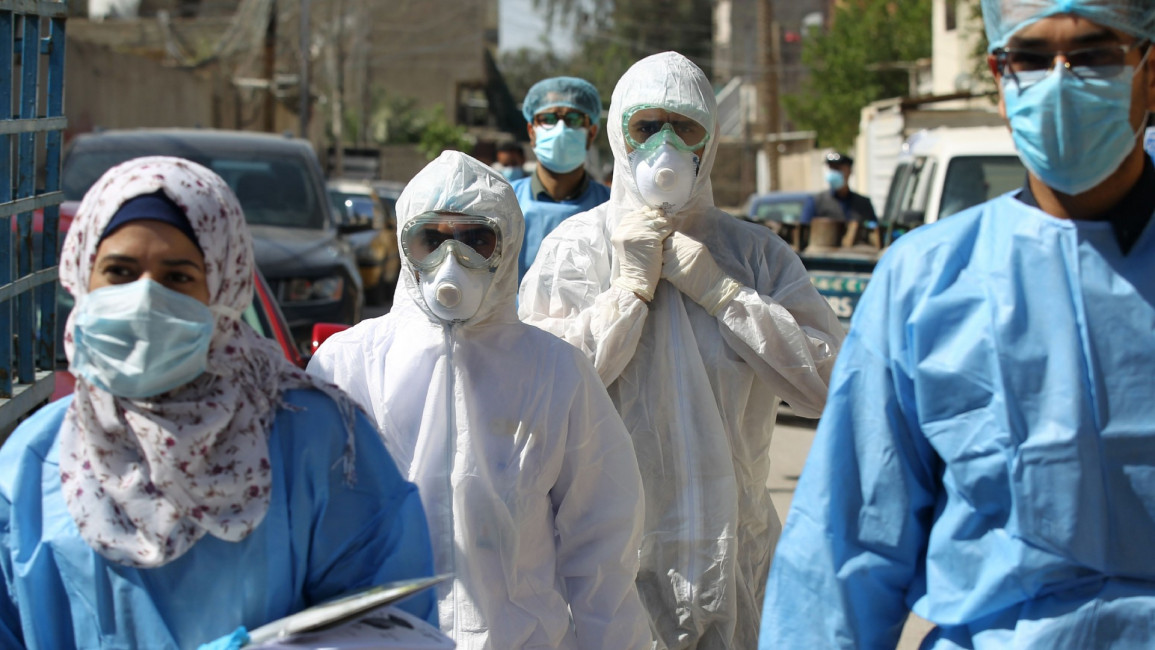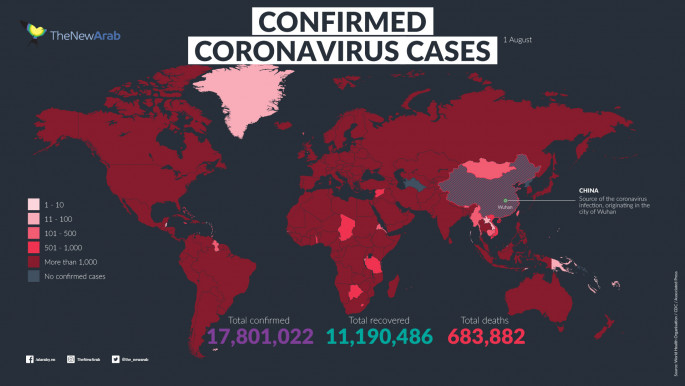"We're collapsing," said Mohammed, a doctor at a Covid-19 ward in Baghdad who declined to use his full name so he could speak freely.
"I just can't work anymore. I can't even focus on the cases or the patients," he said, speaking to AFP at the end of a 48-hour shift.
Iraq has officially registered more than 47,000 coronavirus cases, with doctors increasingly infected.
"I personally know 16 doctors who caught it over the last month," Mohammed said.
The country's overall death toll is heading towards 2,000, with official daily fatalities starting to top 100 in the past week -- and doctors warn they cannot keep up.
In the autonomous Kurdish north, a surge in coronavirus infections has pushed the number of cases there to over 5,000 -- including at least 200 health workers -- and the death toll to more than 160.
The line at the public Ali Naji hospital in the northeastern city of Sulaimaniyah wound out the door, with dozens of people queueing to get tested -- but inside, the medical staff was thinner than ever.
The Kurdish regional government, like federal authorities in Baghdad, is struggling to pay public-sector wages this year due to a collapse in oil prices and an economic recession brought on by the pandemic.
That has had a devastating effect on personnel at state-owned medical facilities, who have not been paid in two months.
Read also: The Iraqi nurse leading Mosul's battle against Covid-19
Health system 'broken'
Exhausted, thousands of healthcare workers at state hospitals in the Kurdish region announced earlier this month they would stop treating non-coronavirus cases.
"At least 20,000 healthcare workers across the region are adhering to this partial strike," said Hawzin Othman, the head of Sulaimaniyah's medical syndicate.
Among them are 800 doctors who joined over the past two weeks, just as the Kurdish region began logging an uptick in Covid-19 cases.
Shevan Kurda, a 30-year-old doctor, is one of them.
"We're working 10-hour shifts every day, but only to treat COVID-19 patients," said Kurda, who represents Sulaimaniyah's Medical Residents Syndicate.
Kurda is owed three months of wages from 2019 and was not paid in either April or May this year.
Authorities and health workers across Iraq have long decried the state of the country's dilapidated hospitals, worn down by years of war, a lack of investment and corruption that has sapped funds meant for new equipment.
Even Prime Minister Mustafa al-Kadhemi told reporters last week: "We do not have a health system.
"The health system is broken, and the most basic requirements are not available, because those who hold positions in some state institutions are incompetent. This has been accumulating for years."
Iraq is also a notoriously dangerous place to be a doctor, as patients' families are known to threaten medical staff -- sometimes with death -- if their loved one's condition deteriorates.
This week, Iraq's medical syndicate declared a strike across the southern province of Dhi Qar after a female doctor was assaulted by a patient's relative.
'Matter of time'
In the capital Baghdad, doctors at several inundated coronavirus wards said they and their colleagues were on the brink of burnout, and complained of a long-standing lack of compensation for overtime.
"There was no bonus for doctors working in field hospitals during the war against the Islamic State group," said Ammar Falah, a 27-year-old medic at one of the city's coronavirus wards.
"There was no bonus when there was mass mobilisation for protests in October," he told AFP, referring to anti-government demonstrations that began late last year and left over 550 people dead.
"You think they're going to give us a bonus now just because we're taking on more hours?"
Falah said the Al-Kindi Training Hospital where he works distributed just five N95 masks to doctors each month.
But with so much interaction with infected patients, Falah said he needed to switch masks much more often and had begun using his $750 monthly take-home pay to buy protective gear.
"If the hours go up more or the workload increases, we'll go on strike too," he said.
At another Baghdad hospital, Wael, a 26-year-old doctor who asked his full name not be used, admitted he was crumbling psychologically.
"Before corona, you could recuperate from the pressure of work by seeing friends and family. But now I go from an isolation ward at work to isolation in my room at home," he told AFP.
He and other doctors said their biggest fear was spreading the virus from their patients to their families -- and with the quickening rate of infection, their worst nightmare could become a reality.
"I exhibited symptoms for a month but I was told to keep working. It's just a matter of time before we're all infected," Wael said.
Follow us on Facebook, Twitter and Instagram to stay connected




